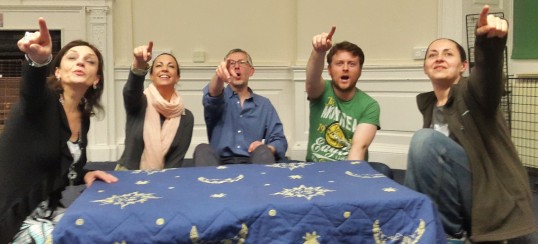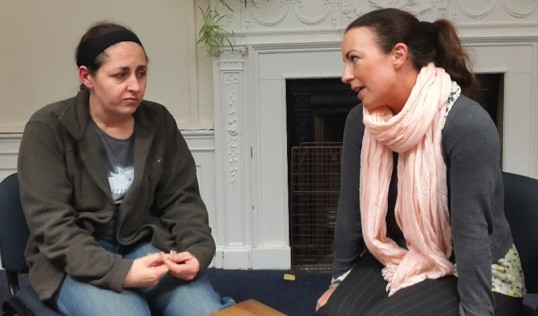Wildest Dreams
★★★★☆ Fascinating
Assembly Roxy: Wed 11 – Sat 14 Nov 2015
Review by Hugh Simpson
Intriguing, amusing and a little troubling, the Grads’ production of Alan Ayckbourn’s Wildest Dreams upstairs at the Assembly Roxy is extremely accomplished.
The play, a comparatively obscure part of the Ayckbourn canon from 1991, tells of a disparate group of four outsiders who meet weekly to play a sword-and-sorcery board game devised by one of their number.
Those who swallow the false characterisation of Ayckbourn as a cheerful boulevardier might be disturbed by the themes of bullying, domestic violence and child abuse depicted here, not to mention the complete mental disintegration of one of the characters
What is a genuine trademark of his work is the way he can entrap the audience into laughing at moments as dark as that disintegration – or also in this case, physical violence and potentially fatal health problems.
If that sounds unacceptably dark, there is definite humour here, together with a humanity that strives to be almost optimistic, which means that characters can be sympathetic even as they are laughed at.
The board game the characters play may seem to date the work, but its purpose in the play – as a method for the characters to retreat from reality – is even more timely considering this is so much easier to do now, not only in internet role-playing games but in all facets of an online existence.
finely judged
Similarly, the play is not really about the game. What is being shown here is how difficult it is for different generations (or genders) to communicate, and how the desire to escape from life’s pressures is often overwhelming. Ayckbourn understands implicitly, as so many commentators fail to, that if gamers use their hobby as a flight from reality, it is a symptom of that flight, not its cause.

Wendy Barrett (Hazel), Cari Sivills (Marcie), Lawrence Wareing (Stanley), Stuart Townley (Warren) and Wendy Brindle (Rick) in rehearsal. Photo: The Grads
Teenager Warren, whose wish to retreat is so strong he does not even want to be human, is well portrayed by Stuart Townley. The balance he strikes between the ludicrous and the sympathetic is reflected in much of this finely judged production.
Wendy Brindle, as taciturn, damaged Rick, is similarly complex and impressive. Cari Sivills plays Marcie, the outwardly more well-adjusted newcomer who becomes the object of fascination for several of the characters, with a similar subtlety. Just what her motivations are remains intriguingly up for debate.
Lawrence Wareing and Wendy Barrett play Stanley and Hazel Inchbridge, the discontented middle-aged couple at the centre of the gaming group, with tact and sympathy. Wareing sometimes seems too inwardly content to bring off those times when Stanley’s repressed emotions surface, while Barrett does not quite nail the hugely difficult arc of her character, but these are really more faults of what is, while always interesting, not one of Ayckbourn’s best structured or more economical works.
fatally underwritten
Those characters who represent the outside world that so alarms the central foursome are more of a mixed bag.
Martin Foreman plays Hazel’s overbearing VAT inspector brother Austen as a compellingly wheezing, sepulchral version of Uncle Fester. Richard Godden, as Marcie’s violent husband Larry, is suitably menacing but seems tonally at odds with much of what surrounds him. Like Beverley Wright, who invests Warren’s mother Thelma with a certain sympathy, he suffers from the part being fatally underwritten.
Angela Harkness Robertson and Charles Finnie provide well judged voiceovers, but they are not well served by sound that is less than perfect. That is one of the few false steps in the production.
Sara-Jane McGeachy’s limpid direction pays as much attention to movement as to delivery, and utilises Gordon Craig’s tripartite set very well. Those moments where action or dialogue coincide or overlap are carefully thought out and evince a clear and focused theatrical intelligence.
There are clear reasons why this play is not Ayckbourn’s best known – indeed, he is so prolific it probably wouldn’t even feature in his top 40. However, there remains a great deal in it that is fascinating, particularly in so sympathetic and intriguing a production as this.
Running time 2 hours 35 mins including 1 interval
Assembly Roxy, 2 Roxburgh Place, EH8 9SU
Wednesday 11 – Saturday 14 November 2015
Daily at 7:30pm
Tickets at http://egtg.co.uk/tickets
Grads website http://egtg.co.uk/index.html
ENDS



















